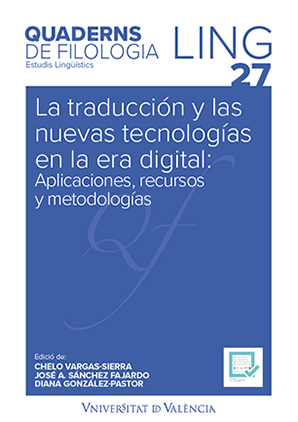Perspectives on video game localization: paratextuality and inclusiveness in the entertainment media of the 21st century
DOI:
https://doi.org/10.7203/qf.0.24663Keywords:
video games, localization, paratexts, inclusive, paratextuality. Abstract
Abstract
Video games are products that try to offer new types of experiences and to paratranslate reality, with the final goal of offering unique experiences that are delivered through every sense of the human body. The public is broader than ever and electronic entertainment products try to be innovative and reflexive, so they can offer fun play sessions, but also in order to recreate reality and offer food for thought to players, regarding social problems. And, for all of this, localization plays a key role. First of all, due to the importance of paratexts and the need to properly adapt them to different markets. Secondly, due to the importance of being an inclusive medium that can be enjoyed by every kind of users, trying to avoid every message to users that relies in “masculine by default”. In this study, we will analyze the market and also several academic studies that delve into video game development and localization. Then, we will cover a series of examples where paratextual elements have been modified to fit better in different markets. Lastly, we will analyze the problem of inclusion and the strategies that are available for localizers in order to help every user to feel represented, regardless of their gender.
 Downloads
Downloads
Downloads
Published
How to Cite
-
Abstract924
-
PDF (Español)732
Issue
Section
License
 Este obra está bajo una licencia de Creative Commons Reconocimiento-NoComercial-SinObraDerivada 4.0 Internacional.
Este obra está bajo una licencia de Creative Commons Reconocimiento-NoComercial-SinObraDerivada 4.0 Internacional.
Authors who publish with this journal agree to the following terms:
- Authors retain copyright and grant the journal right of first publication with the work simultaneously licensed under a Creative Commons Attribution License that allows others to share the work with an acknowledgement of the work's authorship and initial publication in this journal.
- Authors are able to enter into separate, additional contractual arrangements for the non-exclusive distribution of the journal's published version of the work (e.g., post it to an institutional repository or publish it in a book), with an acknowledgement of its initial publication in this journal.
- Authors are permitted and encouraged to post their work online (e.g., in institutional repositories or on their website) prior to and during the submission process, as it can lead to productive exchanges, as well as earlier and greater citation of published work (See The Effect of Open Access).



